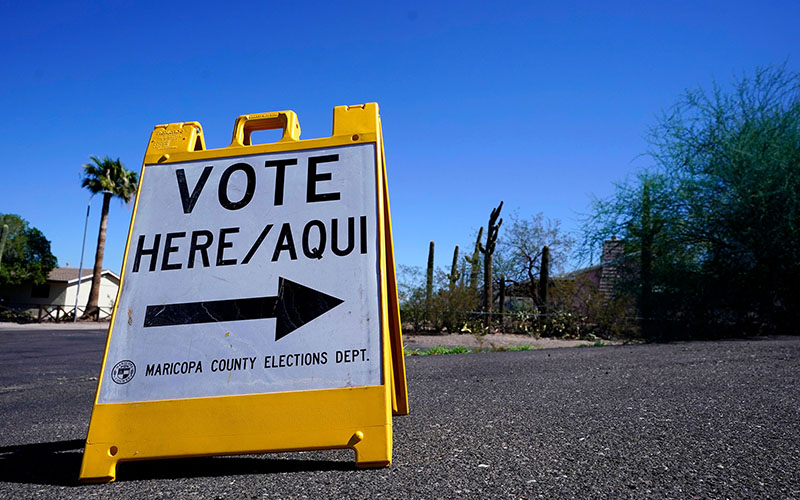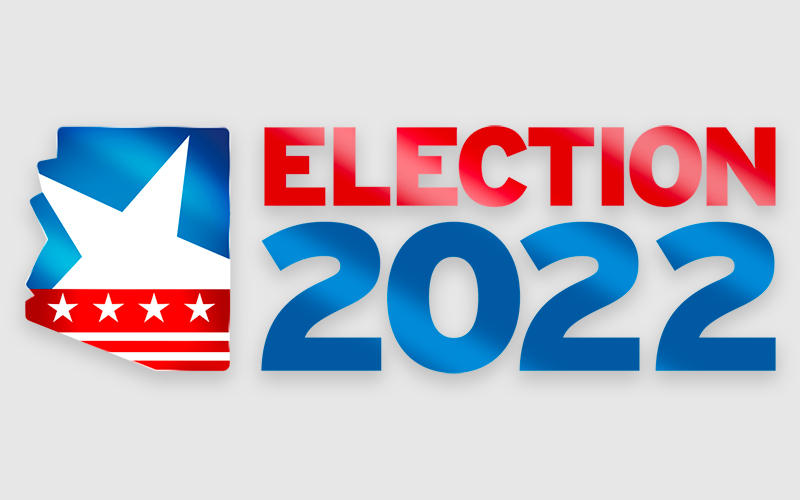
A sign points the way to a polling place on the first day of early voting last week in Phoenix. Voters this fall will have the opportunity to pass a ballot measure that would make it harder to pass ballot measures that raise taxes in Arizona. (Photo by Ross D Franklin/AP/Shutterstock)
WASHINGTON – When Arizona voters approved a measure in 2020 that would have increased school funding by raising income taxes on higher earners, they did so by a comfortable 52-48% margin.
That was too comfortable for supporters of Proposition 132 on this fall’s ballot, which would require any initiative that raises taxes to get approved by at least 60% of voters to pass.
Supporters say the higher threshold is needed to keep special-interest groups from coming to Arizona and spending millions of dollars to win tax increases at the ballot box that they could not win in the Legislature, where any higher taxes must be approved by a two-thirds majority.
Those outside groups think “they can get a slim majority to impose a new tax … on a minority of the population,” said Scot Mussi, president of the Arizona Free Enterprise Club. “So we think a 60% threshold for tax increases is appropriate.”
But critics say it’s not external groups who will be affected by Proposition 132 – it’s Arizona voters, who will see their constitutional right to pass laws at the ballot box severely weakened.
“If we’re about to start changing everything from the state’s inception, it’s really disappointing that the first thing that legislators want to do is take away the voice of the people that they represent,” said Arizona Education Association President Marisol Garcia.
That was echoed by Christie Black, Arizona chapter coordinator of Mormon Women for Ethical Government, who said the ballot process is there to give voters a voice in their governance, which is especially important when the Legislature fails to act in their best interest.
Currently, any ballot initiative can pass with a simple majority of 50% plus one vote. Proposition 132 would amend the Arizona Constitution to require a supermajority for approval of initiatives or referendums proposing new or higher taxes. It would apply only to those measures – all others would still only need a majority.
Critics call the supermajority requirement a solution in search of a problem.
David Lujan, president and CEO of Children’s Action Alliance, points to Proposition 301 in 2000, a 20-year increase in the sales tax to support public education, and Proposition 203 in 2006, which raised tobacco taxes in the state to fund early childhood education.
He said both were “very popular and passed by Arizona voters … but neither one reached the 60% threshold,” with both getting about 53% of the vote.
“Had Prop 132 been in place, these would have failed,” said Andrew Sugrue, an official with the Arizona Center for Economic Progress.
“For years, Arizonans have used direct democracy – the initiative and referendum process – to voice and enact their priorities,” like schools, roads, parks and early childhood development programs, Sugrue said in a statement opposing Proposition 132
Critics say the proposition would needlessly “move the goalposts” on that process.
“Most people in the United States believe in majority rule, right?” asked Garcia. “What this does is actually move the goalposts to 60%, which is not something we were ever raised with, something that is not even necessary to win the presidency, to win the governor’s race, to win a school board, to win anything.”
But the proposition’s backers say revenue proposals are different, pointing to the higher threshold in the Legislature. They argue that if there is an issue on the ballot that Arizonans believe in strongly enough, more than 60% of them will vote for it.
“Ensuring that future tax increases garner broad public support is good policy and creates needed stability in Arizona’s tax code,” said a statement in support of Proposition 132 from Kevin McCarthy, president of the Arizona Tax Research Association.
But Pinny Sheoran, president of the League of Women Voters of Arizona, calls the 60% level almost impossible to meet. As proof, she notes that the legislation that put Proposition 132 on the ballot was only able to garner support 53% of votes in the state Senate and 51% in the House.
The “very same Legislature that has brought this in could not get a supermajority to support the referendum,” Sheoran said.

